It’s not like Mike Cogdill hates Woodfin. In fact, he was raised in the same house that his mother grew up in on the east side of the French Broad River. He now lives on the west side.
“It’s a neat little town,” he says.
So it’s not personal when Cogdill says he wants out. He was against the town’s involuntary annexation of the neighborhoods between Crest Mountain and Olivette Farms 17 years ago. After a new stormwater fee sparked a renewed de-annexation effort in west Woodfin last summer, Cogdill retained his position: Town taxes aren’t worth the services provided.
“It’s like going to Ingles and putting four items in your cart. Then you check out, and they charge you for 10. It’s like, ‘Where’s the other six?’ You don’t get those, but you’re paying for them. Nobody would like that,” Cogdill says. “We’re just paying for nothing. And nothing’s going to change.”
Cogdill is not alone in his frustation. About 300 westsiders signed a petition seeking de-annexation.
A property owner with a house appraised at $300,000 on Woodfin’s westside currently pays about $2,889 in property taxes annually compared with $1,899 for the same house outside town limits, according to county tax rates.
The movement is led by Chip Parton, who was in middle school when the west side was annexed in 2006. He says he wasn’t really paying attention to issues with the town until five or six years ago, when he realized town rules prevented him from putting a single-wide trailer on his parents’ property to live in while he waited to inherit a family home.
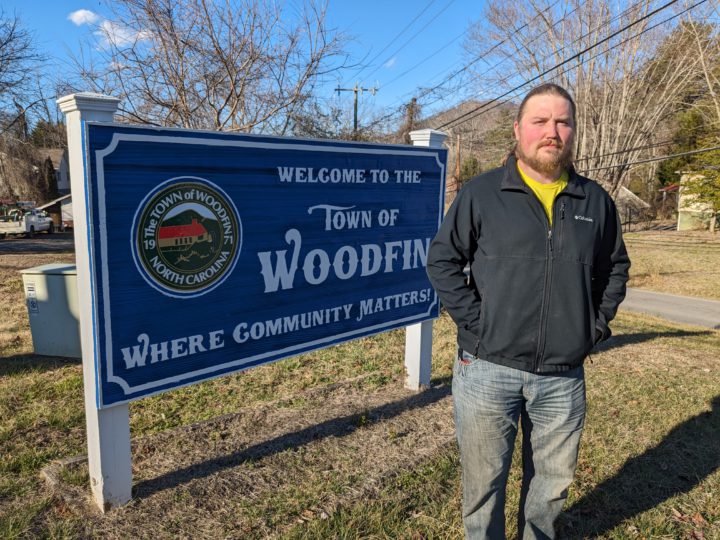
He started to look around and noticed some neighbors were living in detached garages and prefabricated sheds from Home Depot, partially because of rules preventing new single-wides in town limits, he says. Only single-wides that were in place before the rule was changed are currently permitted.
Fast forward to summer 2023, when the town issued bills to property owners for a stormwater fee to comply with a state-issued stormwater permit that the town was in danger of violating. The fee enraged residents on the west side who felt as if they didn’t benefit from a stormwater program — which the town is implementing to prevent runoff from entering the river — and reignited nearly two decades of frustration.
“I basically went up [to Town Hall] to yell at them about it. And then … I realized the last of the old guard only had like four months left. That’s when I was like, ‘OK, it’s time to think bigger than just yelling again and again and again. Maybe we can actually make something happen this time,’” Parton says.
Indeed, after November’s election, no one on Woodfin’s Town Council was involved in town government before 2021. The ex-mayor of 20 years, Jerry VeHaun, retired last year, replaced by Jim McAllister. Town Manager Shannon Tuch was hired in March 2022, bringing with her 19 years of experience in the City of Asheville’s Planning Department but little institutional knowledge of Woodfin’s politics.
The town’s current leadership acknowledges there were issues with the previous administration’s handling of some of the west side’s complaints but disputes the claim that the same level of service isn’t provided townwide.
“While we know the community to the west of the French Broad receives 100% of those services, we also recognize there is a perceived imbalance between the value of the services they receive and the amount they pay in property taxes,” says Council member Eric Edgerton.
While new leadership gives Parton hope, many of Woodfin’s old guard have long given up on the town’s ability to help them.
Lay of the land
On a recent afternoon, Xpress rode with Parton on a tour of Woodfin’s west side. Across the Craggy Bridge — the only physical connection between the east and west sides of town between Asheville and Alexander — the town takes on a rural feel. Down winding back roads, a wide variety of livestock could be seen from the passenger seat of Parton’s construction work truck, from potbellied pigs and horses to goats and sheep.
Farther from the river, Parton notes a tattered Confederate flag marking one property across the road from hand-painted rainbow-colored signs urging peace and love. This, he says, sums up Woodfin’s ideological diversity.
Pointing to sheds and garages that appeared lived in, parcels with broken-down cars or livestock on what appeared to be relatively small lots, Parton exclaims with a healthy dose of sarcasm, “That’s a town!”
Along Olivette Road, Parton points to Woodfin’s black trash cans along the east side of the road as the most notable difference from the west side of the road’s green and blue WastePro cans, signifying the line between county and town limits.
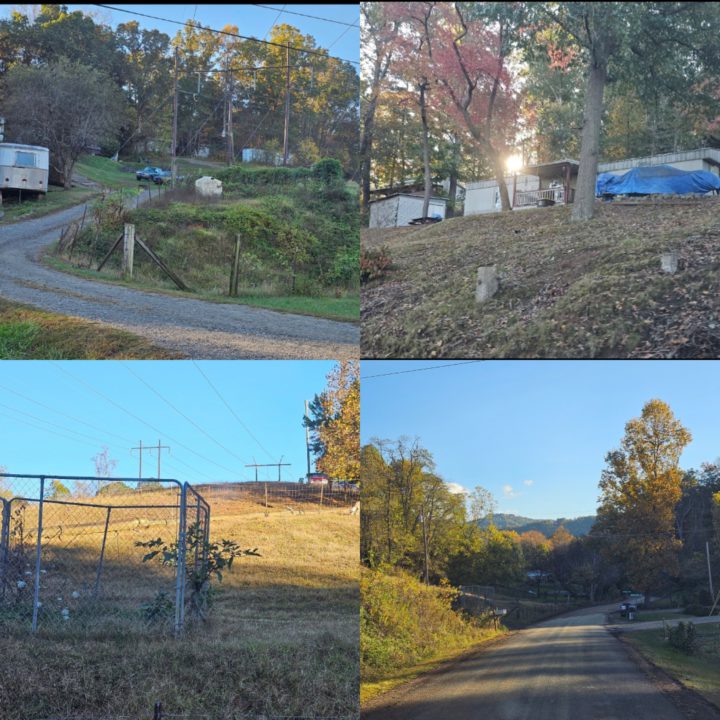
Trash pickup, along with the Woodfin Police Department patrols, are the most obvious services provided by Woodfin. The town maintains a parks department, although there are no parks west of the river. It maintains town roads, although most roads on the west side are maintained by the N.C. Department of Transportation.
Fire service is provided by a network of volunteer fire stations, funded by special taxing districts approved by Buncombe County. The west side is served by the West Buncombe Fire Department, while the east side is served by the Woodfin, Reems Creek and North Buncombe fire departments.
Water is provided to parts of Woodfin by either Asheville or the Woodfin Water and Sewer District, which is an independent entity from the town, with its own elected governing board. Similarly, sewer service is provided by the independent Metropolitan Sewerage District. Much of the town’s west side has neither, instead relying on private wells and septic systems.
Woodfin also has a planning and zoning department, which sets rules on properties, including the allowance of single-wide trailers, livestock allowances and density allotments.
All of these overlapping providers and jurisdictions cause a lot of confusion for Woodfin residents, no matter where in town they live.
Down by the river, MyLissa Fultz says the only service she gets from the town is trash pickup, something she could contract with the county for. She says she never sees the Police Department on her road and doesn’t feel a connection to the town at all.
Duy Nguyen has lived on Woodfin’s west side since 2019, when he moved from Kansas. He says it’s frustrating to see millions spent on the Woodfin Greenway and Blueway just across the river, while largely ignoring needs on the west side.
For Nguyen, who gets water service from the Woodfin Water and Sewer District — a name that adds to the confusion since the district hasn’t provided sewer service in decades — access to city sewer tops his wish list.
He says it’s infuriatingly ironic that he can glance across the river at the largest sewer district in Western North Carolina — MSD serves 201,000 people — but he still has to maintain his own septic system.
“My goodness, we’ve got nothing. We’ve got nothing over here. It’s a big shame for the town government to turn a blind eye up to this point. I hope the new town leaders will make it better.”
Former Mayor VeHaun has been Woodfin’s representative on the MSD board since 2004 and will remain until 2026, according to MSD documents. But he has been unable to get sewer lines extended, partly because the project would carry a large price tag.
Water efforts
At bare minimum, Parton says, being part of a town should mean two things: “You should be able to drink water and you shouldn’t lose your house to a fire.” While Woodfin is the only municipality in Buncombe County other than the tiny towns of Montreat and Biltmore Forest that doesn’t have its own fire department, residents do get that service from the county departments. Water is a different story.
Parton’s neighbor on Hollifield Road has had problems with his well for years. Lane Wyatt, the owner’s son, says the iron-rich water looks like it’s been diluted with orange juice.
“Dad’s been trying to get water up there for 17 years,” Wyatt says. “We’ve got to have a filter system to keep the water from turning black clothes orange.”
In 2020, the town, in conjunction with the water district, applied for federal grant funds to extend the waterline across the river to serve folks like Wyatt’s dad, but funding was denied.
Tuch says it’s unclear why the project wasn’t funded, since it was before her time, and she can’t find documents related to the application in the town’s archives. She says that since the grant that was sought is typically given to municipalities, Woodfin may have been denied because the water system and town are independent entities.
Regardless, Tuch says she hopes to find a funding source for a water and sewer extension project for residents on the west side.
N.C. Sen. Julie Mayfield, who is monitoring the Woodfin de-annexation effort, says there is plenty of state money available for infrastructure projects and urges the town to pursue that pot of money, rather than just looking to the federal government.
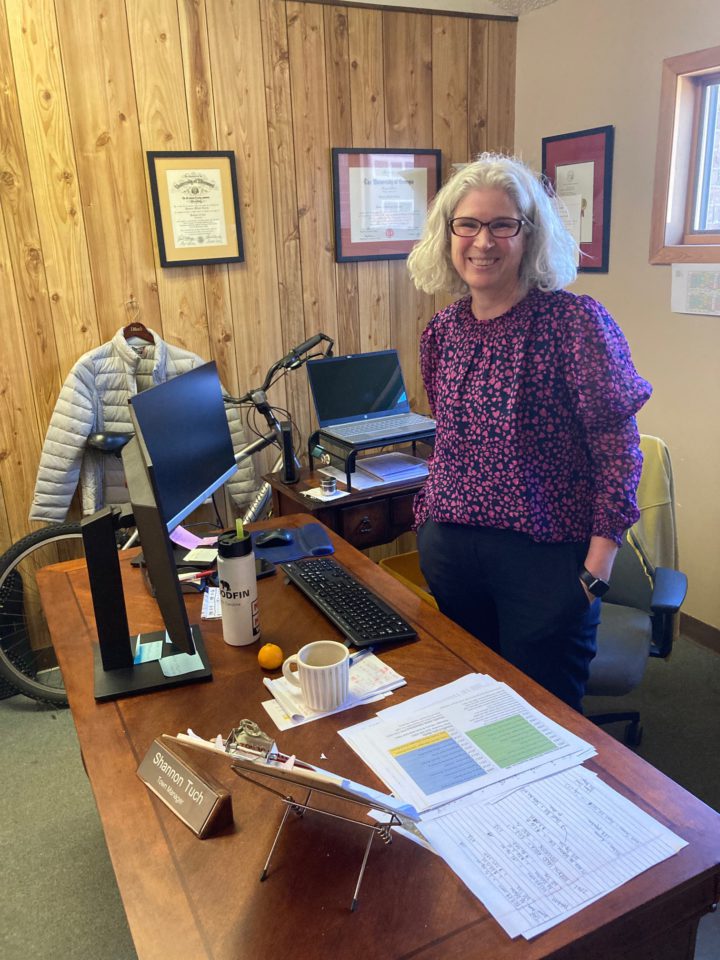
After almost two decades of “being fed smoke,” as Parton says, locals have their doubts.
De-annexation dilemma
In 2012, the N.C. General Assembly passed a law that requires the majority of an area’s residents approve of annexation into a town before it occurs. Parton asserts that the 2006 annexation would never have passed had that law been on the books.
VeHaun says the 2006 annexation was started by a request from Crest Mountain — a gated community development off Dryman Mountain Road that’s closer to New Leicester Highway than the French Broad River. There was fear at the time that the City of Asheville was planning to expand to the north and might annex Crest Mountain, which its residents didn’t want, he says.
Now in the town, only the General Assembly has the power to de-annex an area. That means a member must sponsor a bill to put up for a vote. So far, Mayfield and Rep. Caleb Rudow, both of whom attended a community meeting discussing de-annexation Feb. 1, say they will only support a bill if the town and community agree that part of the town should go.
So, Parton has spent dozens of hours running a data analysis showing the town is losing money by providing services to the de-annexation area, which he says has a relatively low tax base. Based on his analysis, he says the town is actually losing more than $100,000 a year running trash trucks and police cruisers around the west side, while collecting a lower amount of property taxes per capita compared with the rest of the town.
Shown his analysis, Tuch points out several flaws. She says it doesn’t take into account efficiencies of scale. In the case of de-annexation, the town would still be required to provide trash and police service to areas that want to stay in the town on the west side of the river, including the Crest Mountain, Rock Springs and Olivette Farms neighborhoods.
Tuch says Parton’s analysis inappropriately assumes that some services like administration and planning would cost less if part of the town left. Producing a comprehensive plan, for instance, won’t cost 12% less if 12% of the tax base leaves, she says.
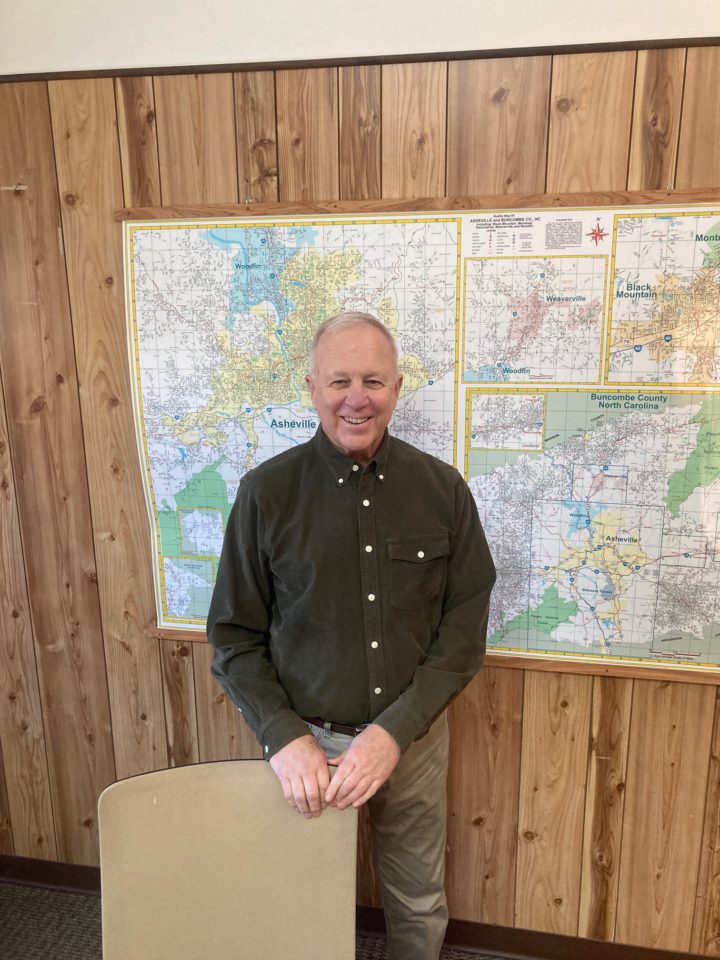
Parton says even if his analysis is off, his point remains that the town isn’t losing so much in tax base that it couldn’t survive without the west side.
Tuch says the town has run its own analysis that suggests 15% of residents in the de-annexation area would actually pay more for trash service with the county than they do in taxes in the town. If rates go up as Waste Pro has suggested they might in recent county commission meetings, that number goes up to 24%, she says.
That has given Town Council members pause.
“It is nearly impossible to attach a dollar value to the town’s efforts in the areas of parks, police, zoning and street maintenance, but even if we set those to one side, we now know de-annexation would be a net financial burden on a significant portion of the property owners in the proposed de-annexation area. Specifically, it would be the most economically challenged property owners who would take a financial hit,” Edgerton says.
Not just a financial decision
Beyond finances, McAlllister says some residents of the west side have quietly suggested to him that they don’t want out of the town. One such resident, Keith Webb, wrote a letter asking McAllister to consider another side of the issue.
“I understand the importance and service which incorporation brings to the life of those residents in the community. That being said, it is difficult for me to support the de-annexation effort over something as simple as a stormwater fee and the fact that zoning may not allow one to install a single-wide modular home on their property. There are certainly opinions on both sides of each and every similar issue,” he wrote.
To Webb’s point, Tuch says de-annexation would do more than just financial damage to the town.
“We are more concerned about the erosion of the community and making sure all residents are treated fairly and equitably.”
McAllister says he is open to changing his mind, but as of his interview with Xpress in mid-February, he does not support de-annexation. Instead, he says he wants to see how the town can provide better service than it has in the past. He says that many residents’ complaints about the previous town administration’s disorganization and misrepresentations of facts may be legitimate, but he insists the town has turned over a new leaf.
Mayfield urges the town to come up with ways to solve problems for those on the west side, including through partnerships, rather than saying something is out of their hands, like maintenance on state roads or water and sewer service.
Tuch says the town is already addressing one need it has heard. She is working on a zoning overlay that would allow single-wides in parts of the west side that want them, she says.
“I didn’t know people wanted that before,” she says.
Still, it’s unclear if those in the de-annexation camp who have felt unheard for 17 years will accept the new administration’s olive branch.
“I hope they’ll do the right thing and just let us go,” Parton says.


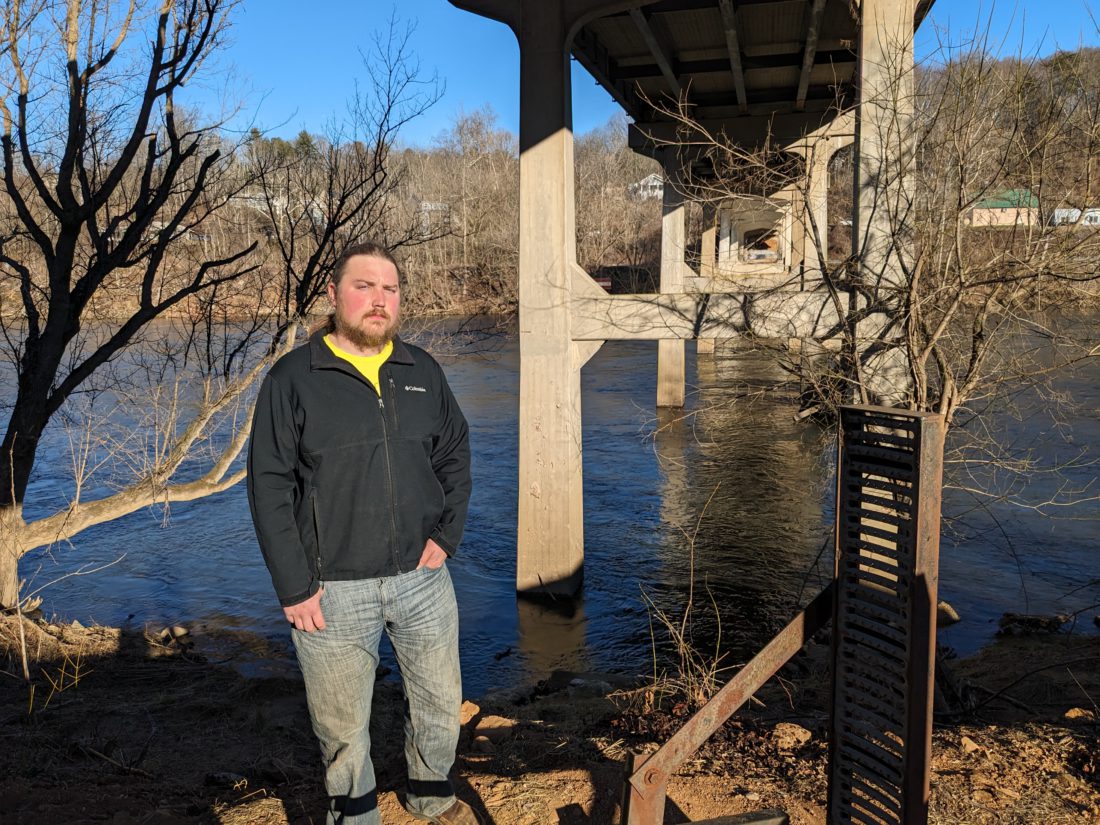
I’m curious how many of these hundreds of people voted in past Woodfin elections since turnout was so low prior to 2021. I’d also like to know if former mayor Vehaun had a personal relationship with the Crest developer and how approvals for that project went or were opposed. The Wave certainly seems costly!
I’ve always been told Woodfin was on the verge of bankruptcy and the developer at Crest was afraid Asheville could take them, so a deal was struck. You can check on Google Maps or the Buncombe GIS and see there’s a road in the development called VeHaun Court, so there was clearly some love on the developers end.
As for voter turnout, probably 40 people or less. Most of the residents over here just prefer to keep their heads down and not get involved. They just want to be left alone and keep to themselves. There’s also the old mindset of “I’m not participating in this town’s business because I never asked to be a part of it”.
I live in north Asheville and am contemplating a similar petition, except to de-annex from the City of Asheville.
What do I get for my $5000/year property tax that I couldn’t pretty much receive living in the County for around half the tax price?
-We have terrible side streets and alleys; the Asheville pothole backlog is >500 due to a poorly funded Public Works Dept which results in understaffing. The main roads are maintained by NCDOT so I’m paying for those with my state
taxes. Virtually every county road I’ve driven on is better than any of Asheville’s “maintained” streets.
-I never see APD on any routine patrols in our neighborhoods or onducting traffic patrols. I doubt the county does much traffic patrolling either, but at least I wouldn’t be paying for that expectation.
– We have a couple of smaller parks; most are drive-in use and by anyone from Woodfin or the county as well as city residents who pay for them.
– Garbage and brush pickup is the best service Asheville provides. But I pay for that with a separate fee.
-The water system in our neighorhood is quite old and the steel pipes spawn lots of nuisance leaks. I also get the occassional plug of brown water, unannounced. When the Water Department does comes to repair, they leave the yard a mess for the owner to clean up and reseed. But again, that service is paid separately and not out of property taxes. Still, I think I’d rather be on a well.
– Asheville Fire response is good, but I feel sure the county fire districts (like Skyland) are comparable. County residents have to pay for their fire districts through a tax assessment of around .10/1000 assessed; however, over half of the fire district cost is subsidized by Asheville residents through sales tax revenue that county leaders have decided to take for themselves. So county residents get a pretty sweet deal for their fire protection and I’d like to get a piece of that action.
If you look around the periphery of Asheville’s bizarro city boundary, places like Town Mountain, Chunns Cove, Biltmore Lake/Enka, Biltmore Forest, The Ramble, areas near Fletcher and Arden, close in Fairview areas, areas just east of the BRP and even Woodfin, pay less in taxes but are able to take advantage of all the assets (downtown, civic center, parks,) Asheville has to offer without having to financially support them.
So I think de-annexing from Asheville makes a lot of sense for me. We’ll see how it goes.
We look forward to hearing of your progress. Funny how all this stuff collides…
A great many residents of Richmond Hill have also talked about de-annexing from Asheville since city council turned their backs on our mixed race neighborhood of affordable homes while we fought off the Bluffs development in Woodfin and asked for some support. The original Bluffs proposal threatened to send 10,000 cars (half the daily volume of Merrimon Avenue traffic) down a narrow street with no sidewalks, bike lanes or on-street parking (essentially a one-lane road). The Buncombe County Fire Marshal determined that another access road would be needed…And still, no help from Asheville City Council while Vice Mayor Kilgore accepted campaign contributions from the Bluffs landowner in the midst of our pleas for help. (The current Woodfin council seems to be far more balanced and superior in thinking to that of Asheville.)
I wish you both the best of luck, it’s not an easy task. Most people in a situation like yours would opt to sue for the lack of services since the municipality is required to give them. What makes Woodfin such a nightmare is they’ve pretty much passed the responsibility to everyone else so they’re legally in the clear. Here’s an example, there was no legal requirement to pass a steep slope ordinance to preserve the wooded hillsides and they did. There’s also no legal requirement for Woodfin to expand water and fire hydrants into the 50ish acres of woods in the north of the de-annex area, so they never will. It’s pathetic that a town is not required to spend some money to actually protect trees, houses, pets, and lives from fires, but they’ll pass building restriction so in the off chance someone buys it years from now they can’t damage the woods too badly with development. You can sue to hold Asheville accountable for dropping the ball, we can only complain and try to convince Mayfield and Rudow to drop a bill to take us out of the Town.
Sign us up!!!
Most if not all our neighborhood here on Beaverdam Rd would sign on to the petition. The city maintenance of our road is pathetic at best, negligent at worst. We have contacted the city numerous times over 4 years to fix and repair potholes and sliding surface of the roadway without a single effort made.